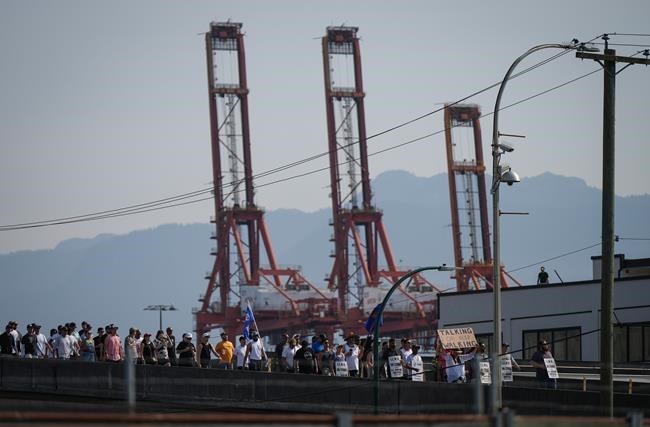VANCOUVER ŌĆö More large-scale disputes like the industrial action at British Columbia's ports may be on the horizon, a labour movement researcher is warning, as longshore workers gathered to consider a possible agreement with employers.
Local chapters of the International Longshore and Warehouse Union sa╣·╝╩┤½├Į met on Tuesday at several locations across the province to discuss the deal. The BC Maritime Employers Association says it's the same agreement union leaders previously rejected without a full membership vote.
McGill University Associate Professor of Sociology Barry Eidlin said it is likely union leaders are under pressure to sell the deal to members due to the spectre of back-to-work legislation ŌĆö even if federal officials have said publicly that resolution-by-negotiation is the preferred outcome.
But Eidlin said members are aware their leadership previously rejected the deal, which "doesn't send a strong signal" about the quality of the deal and gives the impression it is instead getting "rammed through."
Eidlin also said the full membership may not be receptive to the deal, given that issues such as automation and jurisdiction of maintenance work may be "existential" for the long-term viability of these workers' jobs.
"This isn't just about dollars and cents or a pension increase," Eidlin said. "Not that those things aren't important, but these are really some fundamental issues about the future of what work on the dock is going to look like.
"Even if you have the threat of back-to-work legislation looming over the whole process, I think the issues at stake are of such import that members are going to think really hard about what the language in this contract is ŌĆö and whether or not they can live with it."
He said similar issues facing workers in other industries, along with the mounting challenges of cost of living and workplace flexibility, may be changing the labour movement's calculations on whether to use strike action as a negotiating tactic ŌĆö something that has essentially flatlined since the 1990s.
"I think the current moment that we're living in suggests that we could have reached some sort of breaking point, where enough workers are saying, 'We've had enough, we need to do something.'"
Thousands of workers at British Columbia's ports took Tuesday's 8 a.m. shift off to attend meetings and learn details of the union's tentative agreement with the employers.
At one chapter, members filed into meetings at Vancouver's Croatian Cultural Centre to hear from leaders of Local 500, representing longshore and other port workers in the city.┬Ā
Both the front and back parking lots were packed to capacity, and vehicles filled street parking for several blocks as members continued to stream into the building after the meeting's scheduled start at 10 a.m.
Several workers attending the meeting declined to comment to media.
The labour dispute triggered a 13-day strike that started on sa╣·╝╩┤½├Į Day, stopping billions of dollars' worth of goods from moving in and out of some of the country's busiest ports.┬Ā
Strike action was suspended when the contract was reached with the help of a mediator two weeks ago, but it was then reinstated when the union leadership turned down the plan early last week.
A labour board then ruled the second strike action was illegal, prompting the union to issue 72-hour strike notice, which it then reversed hours later.
Dalhousie University Schulich School of Law assistant professor Liam McHugh-Russell called the tumultuous developments "uncommon but not unheard of" in labour negotiation.
McHugh-Russell said while there had been calls from provincial and business leaders for back-to-work legislation had the union fully relaunched strike action, the federal government has been hesitant to go down that path since landmark Supreme Court rulings in 2007 and 2015.
Those rulings are reflected in the government's handling of the port dispute up to this point, he said.
The 2007 decision makes collective bargaining a constitutional right, and the 2015 ruling added the right to strike.
"We are seeing to some degree a playing-out of a shift and a change in the constitutional context in which strikes are played out," McHugh-Russell said. "(The Supreme Court decisions) have really put the brakes on the ability and willingness of government to bring in legislative solutions to these problems."
Union members are expected to vote on the offer later this week, but there's no word yet on when the results could be made public.┬Ā
This report by The Canadian Press was first published July 25, 2023.┬Ā
The Canadian Press


